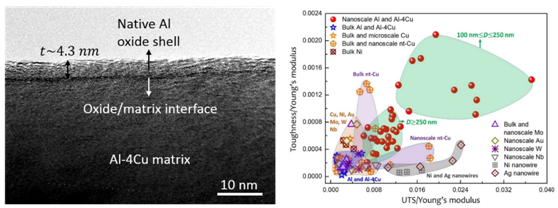Recently, the research team led by Prof.
Weizhong Han, uncovered that small-volume aluminum alloys with native oxide
shell deliver unprecedented strength and toughness, which was published in Acta
Materialia 126 (2017) 202-209.
Mechanical properties of small-volume
metals have attracted tremendous interests in the past decade due to potential
microscale and nanoscale applications. However, some unfavorable deformation
characters, such as strain bursts, lack of strain hardening and near-zero
uniform elongation, are often displayed by the small-volume metals. These deformation
characters plague small-volume metals. How to overcome the deformation
instability, lack of strain hardening and strength-ductility tradeoff still
remains as a bottleneck for the utilization of microscale and nanoscale metals.

Using Al-4Cu alloy as an example, here we
show that a submicron-sized metallic material with ultrathin native oxide shell
exhibits a high degree of deformation controllability, unprecedented strain
hardening, size strengthening and toughness, in uniaxial tensile deformation. The
metal/native oxide “composite” is easy to make, and the emergent properties
extend well beyond the benchmark range known for metals in a normalized (i.e.,
dimensionless) strength-toughness plot (see above). The origin of the
combination of strengthening and plastic stability is that an intact ultrathin
native oxide shell exerts a strong confinement on dislocation movement and
annihilation, thereby breaking the envelope on dislocation storage and strain
hardening achievable in small-volume metals.
Link: http://www.sciencedirect.com/science/article/pii/S1359645416309910


